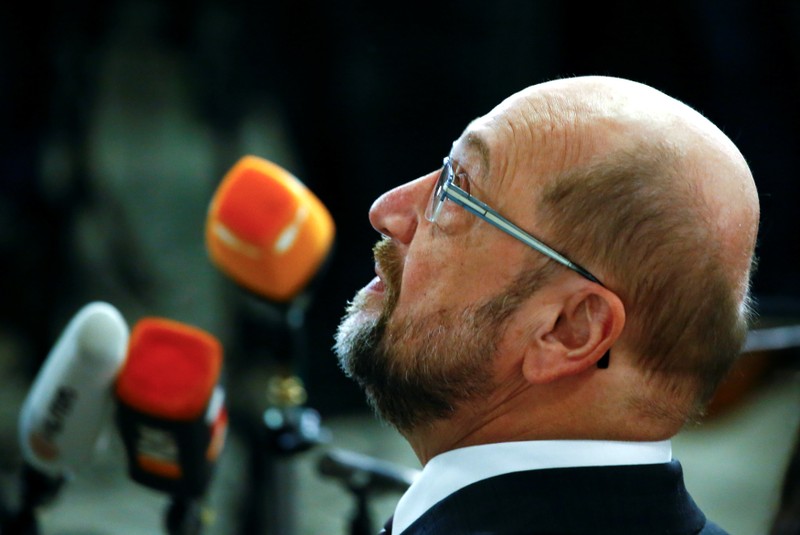
Martin Schulz, Germany’s Social Democratic Party (SPD) leader, looks on as he meets with local SPD members in Dortmund, Germany, January 15, 2018. REUTERS/Wolfgang Rattay
January 15, 2018
By Thomas Escritt and Joseph Nasr
BERLIN (Reuters) – Political heavyweights from Germany’s conservatives and Social Democrats (SPD) sought on Monday to shore up support for talks on joining forces in a coalition, after members of the centre-left party in one region voted against a deal.
With many among the SPD’s rank-and-file opposed to teaming up again with Chancellor Angela Merkel’s conservatives, the party’s national representatives will decide at a congress on Sunday whether to open formal negotiations to renew the ‘grand coalition’ that governed Germany from 2013 to 2017.
SPD leader Martin Schulz was in Dortmund on Monday evening to appeal for backing from members in North Rhine-Westphalia, which will contribute more than a quarter of the votes to the congress.
As he entered that meeting, Schulz said the SPD had “achieved a lot” in the exploratory talks. He said he took seriously concern in the SPD about another “grand coalition” but added: “I’m actually optimistic that we’ll get a majority for it.”
Many of the SPD’s grassroots supporters say the coalition blueprint agreed between the SPD and Merkel’s CDU/CSU alliance last week reflects too few of their aims and the party should reinvent itself in opposition.
On Saturday, youth activists rallied the SPD in the eastern state of Saxony-Anhalt into voting against a deal..
In remarks seemingly intended to appease opponents of the blueprint in North Rhine-Westphalia, its conservative state premier Armin Laschet said on Monday it would be further refined.
But that concession seems unlikely to win over SPD activists in the state, who say the preliminary agreement makes too many concessions, containing no pledges to raise taxes on top earners or abolish Germany’s dual public-private health insurance system in favour of a single “citizen’s insurance”.
If Schulz fails to persuade them, the talks could collapse, deepening the mood of political uncertainty that has gripped Europe’s largest economy and key power-broker since an earlier attempt by Merkel to form a three-way coalition with two smaller parties collapsed in November.
Schulz defended the draft, telling the RND newspaper network in an extract from an interview to be published on Tuesday: “We pushed through a long list of points which will really improve people’s lives.” While the party had not got everything it wanted, “what we did push through justifies starting coalition negotiations.”
His sentiments were echoed by SPD parliamentary leader Andrea Nahles, who told Passauer Neue Presse newspaper the party had scored points on nursing care, pensions, education and labour market policy.
“We should stop badmouthing the result,” she said.
“ENDLESS NEGOTIATION”
In inconclusive national elections in September, the conservatives lost votes to the far-right Alternative for Germany (AfD) party.
But the SPD performed even worse, notching up its worst result since the foundation of the Federal Republic in 1949. Opponents of the deal within the party say it would suffer even bigger losses in the next national election if it renewed the coalition.
As a sweetener, senior SPD member Wolfgang Tiefensee suggested the party could demand a clause in any final coalition agreement that committed Merkel to calling a vote of confidence two years into the next government’s four-year term.
“Should everything work fine we will continue,” said Tiefensee, economy minister in the state of Thuringia. “If not, there will be a new election.”
Jackson Janes, president of the American Institute for Contemporary German Studies in Washington, said he expected the SPD party congress to approve the start of coalition talks despite the resistance by the youth wing of the party.
“There’s too much at stake,” he said. “Nearly everyone …at the top of the party is supporting this. The heavies are working this fairly strongly.”
Even if SPD delegates approve formal talks, a fourth term for Merkel is not guaranteed, and Schulz has promised to put the terms of any deal to a vote by the 443,000 SPD members.
In trying to sell it, he can point to lower taxes for low-income households that traditionally formed the backbone of the party’s support base.
But any softening of conditions is likely to meet opposition from the Christian Social Union (CSU), the arch-conservative Bavarian sister party of Merkel’s Christian Democrats (CDU).
“I can’t imagine that we will substantially change the agreement reached in exploratory talks,” said CSU leader Horst Seehofer, dismissing the demands of a “worked-up” SPD.
(Additional reporting by Joern Poltz in Munich, Andrea Shalal and Michelle Martin in Berlin and Reuters Television in Dortmund; editing by John Stonestreet)

